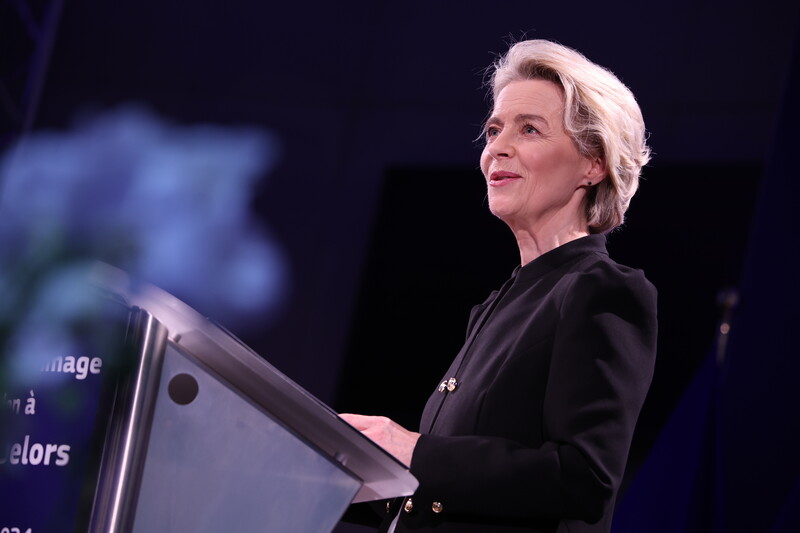Rights and Accountability 29 February 2024

Ursula von der Leyen’s support for genocide must never be forgotten.
European UnionUrsula von der Leyen sees genocide as a business opportunity.
Just this week, the European Commission president argued that a new “mindset” is required to bolster the weapons industry.
“The continuing war in Gaza and the large-scale destabilization in the Middle East point to an era of insecurity and conflict in the region and beyond,” she said.
The comment on Palestine in a speech about assisting arms makers prompts an unavoidable conclusion: Von der Leyen is exploiting the crisis to urge greater militarization.
It must never be forgotten that von der Leyen offered her full backing to Israel’s current war on Gaza as soon as it was declared.
While she may be choosing her words more carefully these days, the institution which she heads remains depraved.
On 15 February, Dimiter Tzantchev, the European Union’s ambassador in Tel Aviv, tweeted that he had a “good meeting” with Roey Fisher, who had just taken up a new senior level post in Israel’s economy ministry.
Following a freedom of information request, it was confirmed that the meeting was arranged by trade officials working for the European Commission (the EU’s executive).Less than three weeks earlier, the same European Commission had signaled that it was taking seriously the order which the International Court of Justice delivered to Israel.
The European Commission expected the “full, immediate and effective implementation” of the court’s “provisional measures.” The measures included a demand that Israel stop killing Palestinians in Gaza.
Israel has not respected those measures, all of them aimed at halting or preventing genocide. And yet the European Commission has been exploring ways to strengthen its economic relations with Israel at a time when it is perpetrating genocide, widely regarded as the worst crime against humanity.
Profiting from war crimes
In his 15 February tweet, Dimiter Tzantchev commended legislation known as “What is good for Europe is good for Israel.”
The aim of that bill is to cut the number of inspections at ports in Israel of goods already approved by the EU.
The phrase “what is good for Europe is good for Israel” was uttered by Benjamin Netanyahu in May last year.
Netanyahu was celebrating how the French supermarket chain Carrefour had entered the Israeli market. As red tape is being removed, goods on Carrefour’s shelves will “not need to pass the unnecessary bureaucratic impediment of receiving an Israeli standard,” the prime minister said.
Carrefour has subsequently boasted that it donated “thousands of personal shipments” to Israel’s troops. The firm has even expressed pride in contributing to Israel’s “national effort” – a euphemism for the Gaza genocide.
The investments by Carrefour that excited Netanyahu involved a deal between the French corporation and the Israeli retail chain Yenot Bitan. Under it, Carrefour is taking over Yenot Bitan’s network of stores, some located within Israel’s settlements in the occupied West Bank.The construction and expansion of those settlements are war crimes under the Fourth Geneva Convention. By seeking greater trade with Israel, the European Union is implicitly approving efforts to profit from war crimes.
No appetite for accountability
Ursula von der Leyen must bear responsibility for the constant caressing of Israel by the European Commission.
She does not act in a vacuum.
Josep Borrell, the EU’s foreign policy chief, alleged recently that von der Leyen was not “representing anyone but herself” when she sided completely with Israel in October.
Despite lately seeking restraint, Borrell himself expressed solidarity with Israel in the initial stages of the genocide.
And the EU’s 27 governments – without exception – effectively gave Israel carte blanche to destroy Gaza in October by dishonestly portraying the war as an act of self-defense.
Months later, there is still no real appetite for holding Israel to account among EU leaders.
Spain and Ireland are the only two EU countries to formally seek an “urgent review” of the association agreement with Israel amid the Gaza genocide. That agreement – covering economic and political cooperation – is conditional on respect for human rights.
Ireland’s senate voted unanimously last week for a ban on goods from Israel’s settlements in the West Bank. Such a ban had already been won majority approval in the senate and the other house in the Oireachtas – Ireland’s parliament – yet was blocked from coming into effect by the Dublin government on the disputed pretext that the EU would not allow such a step.
Surely, it is time for Ireland and Spain to go beyond timid requests. If they cannot convince their EU partners to take action, then they should do so without approval from Brussels.
Like all the other EU states, Ireland and Spain have already accommodated the genocide by portraying it as an act of self-defense. Failure to impose sanctions on Israel will mean they are accommodating the genocide even further.





